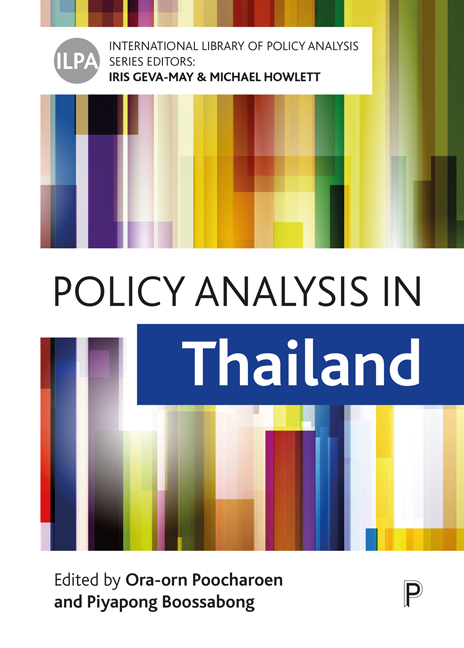Book contents
- Frontmatter
- Contents
- List of figures and tables
- List of abbreviations
- Notes on contributors
- Editors’ introduction to the series
- Introduction
- Part One History, styles and methods of policy analysis in Thailand
- Part Two Policy analysis within executive government
- Part Three Policy analysis beyond executive government
- Part Four Political parties and interest groups in policy analysis
- Part Five Policy analysis education and research
- Index
eighteen - Transition and prospects of Thai policy analysis
Published online by Cambridge University Press: 20 January 2024
- Frontmatter
- Contents
- List of figures and tables
- List of abbreviations
- Notes on contributors
- Editors’ introduction to the series
- Introduction
- Part One History, styles and methods of policy analysis in Thailand
- Part Two Policy analysis within executive government
- Part Three Policy analysis beyond executive government
- Part Four Political parties and interest groups in policy analysis
- Part Five Policy analysis education and research
- Index
Summary
Introduction
Thailand's practice of policy analysis is comparable to other middle-income countries where there are policy analyst positions in the public sector and there are academics and think tanks that work on various policy issues. Training, research and education on policy analysis also exist. However, compared to the United States, the United Kingdom and EU member countries, Thailand lags in many aspects of policy analysis, including weak policy making and policy research nexus, lack of professionalisation of policy expertise, limited usage of policy analytical approaches and tools, and an ill-formed policy ecosystem that is lopsided, favouring only the well-connected and well-resourced in society. Using the comparative perspective, this chapter first explains the current context of being ‘in-between’ that Thailand is experiencing. Then we offer observable six trends of ‘transition’ that might help advance Thailand's policy analysis and policy-making practice.
Being ‘in-between’
In this first section, we propose understanding Thailand as an ‘in-between’ state. First, the term in-between refers to how Thailand is neither a strong, stateled centralised model nor a strong, democratic, pluralistic society-led model. It is somewhere in-between. Unquestionably, Thailand displays authoritarianism and a steady decline of the democratic values of political freedom, civil and human rights, and civil society activism; however, it is certainly not a strong state. A strong state that comes to mind is Singapore, where policy analysis is conducted by top policy analysts who work for the state and implemented with a high success rate (Quah, 2018). In Thailand, there is a constant tug-of-war between those who want technocratic policy making and analysis and those who advocate for more autonomy and more democratic policy making and analysis. The state of being ‘in-between’ explains why policy analysis training in Thailand continues to be hidden in the shadows of the field of public administration. Policy analysis is still thought of as a purely technical activity. As long as this tug-of-war exists, it is difficult to have clear directions or consensus on principles for policy analysis in this country.
- Type
- Chapter
- Information
- Policy Analysis in Thailand , pp. 320 - 336Publisher: Bristol University PressPrint publication year: 2023



